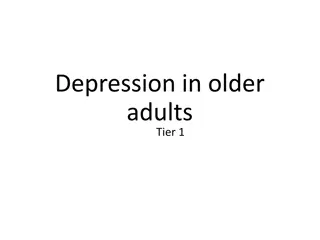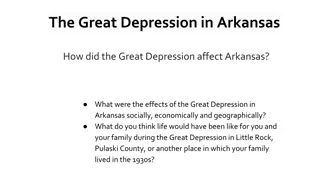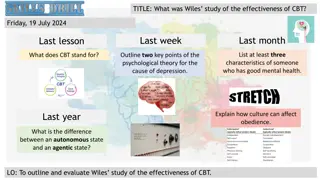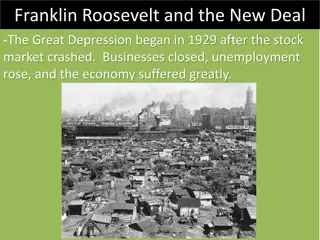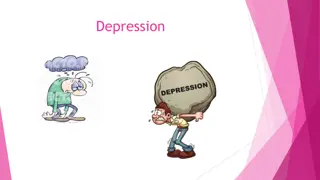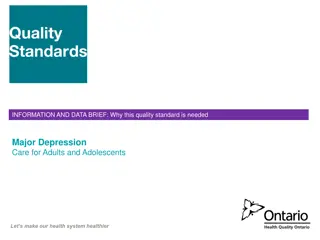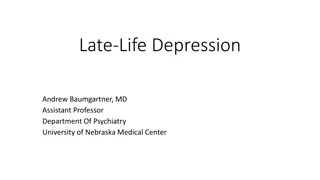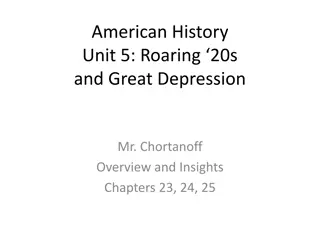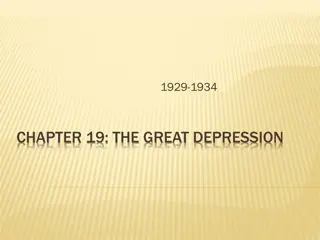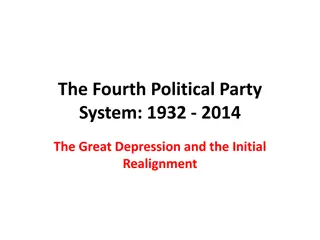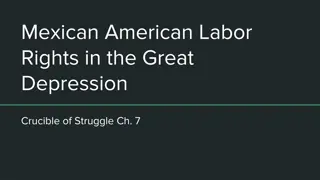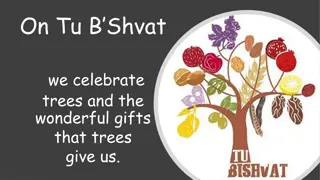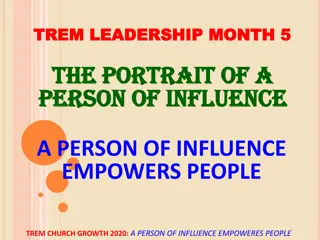Influence of Great Depression on John Steinbeck's Grapes of Wrath
John Steinbeck's personal experience during the Great Depression and Dust Bowl migration strongly influenced his portrayal in The Grapes of Wrath, capturing the human dignity and struggles faced by those affected. The novel depicts the conflict between the powerful and powerless, showcasing themes of injustice and societal inequalities. Steinbeck's narrative reflects the harsh realities of the era, shedding light on the economic and political turmoil of the time with a nuanced perspective.
Download Presentation

Please find below an Image/Link to download the presentation.
The content on the website is provided AS IS for your information and personal use only. It may not be sold, licensed, or shared on other websites without obtaining consent from the author. Download presentation by click this link. If you encounter any issues during the download, it is possible that the publisher has removed the file from their server.
E N D
Presentation Transcript
The Grapes of Wrath John Steinbeck . First published in 1939, Steinbeck s Pulitzer Prize winning epic of the Great Depression chronicles the Dust Bowl migration of the 1930s and tells the story of one Oklahoma farm family, the Joads, driven from their homestead and forced to travel west to the promised land of California. . It tackles human dignity and moral vision of living in at least moderate level of living. . A portrait of the conflict between the powerful and the powerless, of one man s fierce reaction to injustice, and of one woman s stoical strength, the novel captures the horrors of the Great Depression and achievements of the very nature of equality and justice in America. . How did John Steinbeck's personal experience with the Great Depression and the Dust Bowl migration influence his portrayal of these events in the Grapes of Wrath? Does the book accurately depict the political and economic situations of the time or is there bias? .
The Grapes of Wrath John Steinbeck demonstrated by the rise of fascism in depression-torn Europe and America. For all that, 15 million unemployed Americans in 1932 had scant perspective about the recovery that would eventually make their nation the world s wealthiest and most powerful. President Roosevelt s famous phrase the only thing we have to fear is fear itself. The story of the Great Depression, on the other hand, extends far beyond the perspective of any novelist, no matter how great he or she is. Novels have a timeless aesthetic and psychological resonance (echo) in addition to their significance as historical documents. The novels in this series are extraordinarily well-placed windows from which to observe and understand the impact of the Depression on so many Americans. Novels dramatize the widely diverse ways that people coped with disaster; they can be viewed as fictional therapies (treatment) for a virulent (bad) economic sickness. Some of our writers are made hopeful by a vision of social solidarity among Americans of traditionally antagonistic race and class. Others see tragedy in the symbolic exhaustion of heroism in figures who in any earlier period would have embodied an inexhaustible American optimism. they transport their readers into an age of anxiety, struggle, defeat, and despair; yet through it all, the fictional and the actual Americans managed to endure. As Margaret Mitchell s Scarlett O Hara so famously put it: After all, tomorrow is another day.
The Grapes of Wrath John Steinbeck As unemployment reached an all time high in 1933, this decade, sandwiched between the roaring twenties and World War II, left little to be highlighted other than the dismal consequences of the Great Depression. From failed farmers to discouraged businessmen to working mothers to displaced children, the Depression between 1929 and 1939 invaded homes across the nation. Twenty-five percent unemployed at the peak of the Depression in 1933 while even more just barely made ends meet. of the country was
The Grapes of Wrath: themes Man s Inhumanity to Man: Steinbeck consistently and woefully points to the fact that the migrants great suffering is caused not by bad weather or mere misfortune but by their fellow human beings. Historical, social, and economic circumstances separate people into rich and poor, landowner and tenant, and the people in the dominant roles struggle viciously to preserve their positions. Steinbeck portrays the state as the product of land-hungry squatters who took the land from Mexicans and, by working it and making it produce, rendered it their own. Now, generations later, the California landowners see this historical example as a threat, since they believe that the influx of migrant farmers might cause history to repeat itself. In order to protect themselves from such danger, the landowners create a system in which the migrants are treated like animals, shuffled(mixed) from one filthy(dirty) roadside camp to the next, denied livable wages, and forced to turn against their brethren simply to survive.
The Grapes of Wrath: themes The Saving Power of Family and Fellowship The Grapes of Wrath chronicles the story of two families : the Joads and the collective body of migrant workers. Although the Joads are joined by blood, the text argues that it is not their genetics but their loyalty and commitment to one another that establishes their true kinship. In the migrant lifestyle portrayed in the book, the biological family unit, lacking a home to define its boundaries, quickly becomes a thing of the past, as life on the road demands that new connections and new kinships be formed. The reader witnesses this phenomenon at work when the Joads meet the Wilsons. In a remarkably short time, the two groups merge into one, sharing one another s hardships and committing to one another s survival. This merging takes place among the migrant community in general as well: twenty families became one family, the children were the children of all. The loss of home became one loss, and the golden time in the West was one dream. In the face of adversity, the livelihood of the migrants depends upon their union. As Tom eventually realizes, his people are all people.
The Grapes of Wrath: themes The Dignity of Wrath The Joads stand as exemplary figures in their refusal to be broken by the circumstances that conspire against them. At every turn, Steinbeck seems intent on showing their dignity and honor; he emphasizes the importance of maintaining self-respect in order to survive spiritually. Tom have left the family; Rose of Sharon gives birth to a stillborn baby; the family possesses neither food nor promise of work. Steinbeck makes a clear connection in his novel between dignity and rage. As long as people maintain a sense of injustice a sense of anger against those who seek to undercut their pride in themselves they will never lose their dignity. This notion receives particular reinforcement in Steinbeck s images of the festering grapes of wrath in which the worker women, watching their husbands and brothers and sons, know that these men will remain strong as long as fear [can] turn to wrath. The women s certainty is based on their understanding that the men s wrath bespeaks their healthy sense of self-respect.
The Grapes of Wrath: themes The Multiplying Effects of Selfishness and Altruism According to Steinbeck, many of the evils that plague the Joad family and the migrants stem from selfishness. Simple self-interest motivates the landowners and businessmen to sustain a system that sinks thousands of families into poverty. In contrast to and in conflict with this policy of selfishness stands the migrants behavior toward one another. Aware that their livelihood and survival depend upon their devotion to the collective good, the migrants unite sharing their dreams as well as their burdens in order to survive. Steinbeck constantly emphasizes self-interest and altruism as equal and opposite powers, evenly matched in their conflict with each other. Steinbeck presents both greed and generosity. Ma assumes the responsibility of making decisions for the family.




